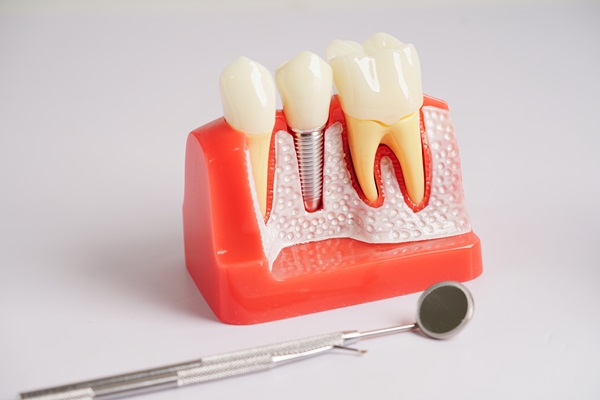3 Important Advantages of Dental Implants

Of the many treatments available to replace missing teeth, dental implants are relatively recent and also very common. Tooth loss, whether from trauma or severe decay, can impact appearance and undermine a beautiful, confident smile. With a metal rod inserted into the jaw like the roots of the tooth and a prosthesis shaped like the visible crown, implants closely mimic natural teeth. In addition to restoring uniformity of the smile, implants offer many advantages that make them popular with patients.
What are the advantages of dental implants?
These are some of the advantages of implants most commonly cited by dentists and patients alike.
1. Improved function and durability
After the metal rod of the implant is inserted in the jaw, it is given time for the bone to grow around it. During this process, called osseointegration, the jawbone and the implant become as closely bonded together as the original tooth was in the bone. The prosthesis on top is made of a hard material that is nearly as strong as natural enamel. As a result, implants feel nearly identical to natural teeth and provide almost equal bite force. Once you have recovered completely from surgery, there are few restrictions with implants, so you can go back to eating the food you liked prior to your tooth loss. Your speech may also become clearer with implants replacing the missing teeth.
Dental hygiene requirements for implants are similar to those for natural teeth. If they receive the proper care, implants may last for decades and may never need replacement. The success rate of dental implants is also very high, approximately 98%.
2. Natural appearance
The visible, tooth-shaped portion of the implant is made of a ceramic material, such as porcelain. In addition to being nearly as strong as tooth enamel, ceramic has qualities that closely mimic its appearance. It reflects the light similarly to the way that enamel does and comes in a wide range of tooth-colored shades. The dentist performs a color match by comparing your teeth to a guide that includes all the possible choices. Each shade is identified by an alphanumeric code so the dentist can communicate to the lab that makes the prosthesis exactly which color to use. Ultimately, the implant's tooth is virtually indistinguishable from the others even on close examination.
3. Better overall oral health
Getting an oral implant may actually be good for your mouth. The metal rod stimulates the jaw to prevent calcium resorption, which can lead to a loss of bone density. Filling in the gap between the teeth prevents them from tipping toward each other or otherwise shifting in position. This helps preserve the effectiveness of your bite. A dental implant is a restoration that does not require any alteration to healthy teeth adjacent to it.
What questions should you ask about getting dental implants?
Placing an implant requires two surgeries, with a healing period of several months between the two to allow for osseointegration. If the jaw bone has insufficient density to support an implant, it may require a grafting procedure with its own osseointegration period, which may prolong treatment time. These concerns and more should be discussed with the dental provider.
How many teeth can be replaced with implants?
The ability to customize implants to a particular dental need is another significant advantage of this restorative solution. Implants can be used to replace a single tooth or treatment could cover an entire set of teeth.
Can an implant hold more than one artificial tooth?
It is common for two adjacent teeth to be replaced through one implant. The dental specialist will examine the contour of the gum and look at the replacement to ensure the teeth look natural.
How many teeth can be replaced with implants?
The ability to customize implants to a particular dental need is another significant advantage of this restorative solution. Implants can be used to replace a single tooth or treatment could cover an entire set of teeth. A mouthful of implants could be referred to as a full mouth crown or a bridge.
Conclusion
Like any other dental restoration, dental implants have advantages and disadvantages. Patients enjoy the freedom to eat or speak with confidence, as the implants are securely held in place and will not shift like dentures. There is also the added benefit of increased confidence from a natural-looking smile restoration. For many patients, the benefits significantly outweigh the risks of implant surgery and the possibility of needing a grafting procedure.
Request an appointment here: https://www.carmelsmilesdentist.com or call Smiles in the Village Dentistry at (317) 218-7985 for an appointment in our Carmel office.
Check out what others are saying about our dental services on Yelp: Dental Implants in Carmel, IN.
Related Posts
Dental implants are one of the most common ways to replace missing teeth in general dentistry nowadays. These are screws or rods (typically made out of titanium) that can serve as artificial teeth roots. Oral restorations like crowns are fitted to implants to replace missing teeth. Implants are constructed to last a lifetime, but the…
Wanting to learn more about the implant dentures options available nowadays? Smart. The more you understand about each of the different denture choices available, the more likely you are to make a decision that is right for you. Wearing dentures is important when you are living with damaged teeth and/or missing multiple teeth or all…
If you are constantly struggling with your oral health, then you may be a good candidate for mini implants. After tooth loss, it becomes necessary to create a plan for how you are going to replace your teeth as quickly as possible. Tooth loss can lead to further damage by initiating the process of resorption.…
Dental implants are the most modern and effective way to replace lost teeth. Unfortunately, the American Academy of Implant Dentistry finds that "More than 35 million Americans are missing all their teeth in one or both jaws." This condition occurs largely due to age, diseases, or accidents. Living without teeth or with fewer teeth than…


